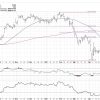Scientists have long viewed Saturn’s moon Enceladus, which harbors an ocean beneath its thick, icy shell, as one of the best places to search for life beyond Earth.
Now, a new analysis of data collected by NASA’s Cassini mission, which orbited Saturn and its moons between 2004 and 2017, has uncovered intriguing evidence that further supports the idea of Enceladus as a habitable ocean world.
Enceladus initially captured the attention of scientists in 2005 because plumes of ice grains and water vapor were observed rising through cracks in the moon’s ice shell and releasing into space. The spacecraft flew through the plumes and “sampled” them, with data suggesting the presence of organic compounds within the plumes, some of which are key for life.
The latest data analysis of Cassini’s flybys of Enceladus revealed the detection of a molecule called hydrogen cyanide that’s toxic to humans but crucial to processes driving the origin of life. What’s more, the team also found evidence to support that Enceladus’ ocean has organic compounds that provide a source of chemical energy that could potentially be used as powerful fuel for any form of life.
A study detailing the findings was published Thursday in the journal Nature Astronomy.
“Our work provides further evidence that Enceladus is host to some of the most important molecules for both creating the building blocks of life and for sustaining that life through metabolic reactions,” said lead study author Jonah Peter, a doctoral student of biophysics at Harvard University, in a statement.
“Not only does Enceladus seem to meet the basic requirements for habitability, we now have an idea about how complex biomolecules could form there, and what sort of chemical pathways might be involved.”
The ingredients necessary for life as we know it on Earth include water, energy and chemical elements. The new research provides scientists with chemical blueprints that can be tested in labs, Peter said.
Finding building blocks for life
Amino acids are some of the building blocks of life, and hydrogen cyanide is considered to be a versatile molecule that allows amino acids to form, according to the study authors.
“The discovery of hydrogen cyanide was particularly exciting, because it’s the starting point for most theories on the origin of life,” Peter said. “The more we tried to poke holes in our results by testing alternative models, the stronger the evidence became.
Eventually, it became clear that there is no way to match the plume composition without including hydrogen cyanide.”
Previously, molecules such as carbon dioxide, methane, molecular hydrogen, water and ammonia were detected in Enceladus’ plumes, which reflect the composition of the ocean beneath the ice shell that generates the plumes.
The combination of these elements together suggested a process called methanogenesis, or the metabolic creation of methane, may be at play on Enceladus. Scientists suspect methanogenesis may have also played out on early Earth, contributing to the origin of life.
But the new research indicates more varied and powerful chemical energy sources are occurring within Enceladus’ ocean. In addition to hydrogen cyanide, organic compounds detected in the analysis included acetylene, propylene and ethane along with traces of an alcohol like methanol and molecular oxygen, suggesting there’s more than one way to sustain life inside the ocean world.
“If methanogenesis is like a small watch battery, in terms of energy, then our results suggest the ocean of Enceladus might offer something more akin to a car battery, capable of providing a large amount of energy to any life that might be present,” said study coauthor Kevin Hand, deputy project scientist at NASA’s Jet Propulsion Laboratory in Pasadena, California, in a statement.
Now, the study authors want to investigate how diluted the organic compounds are within the subsurface ocean because the dilution of these compounds could determine whether Enceladus could support life.
In the future, astronomers hope to send a dedicated mission to investigate Enceladus, which could provide a definitive answer as to whether life exists in the ocean world.
While the Cassini mission ended six years ago, its data is still a treasure trove of new information.
“(The mission’s) observations continue to provide us with new insights about Saturn and its moons — including the enigmatic Enceladus,” said study coauthor Tom Nordheim, planetary scientist at JPL who worked on the Cassini mission, in a statement.







































